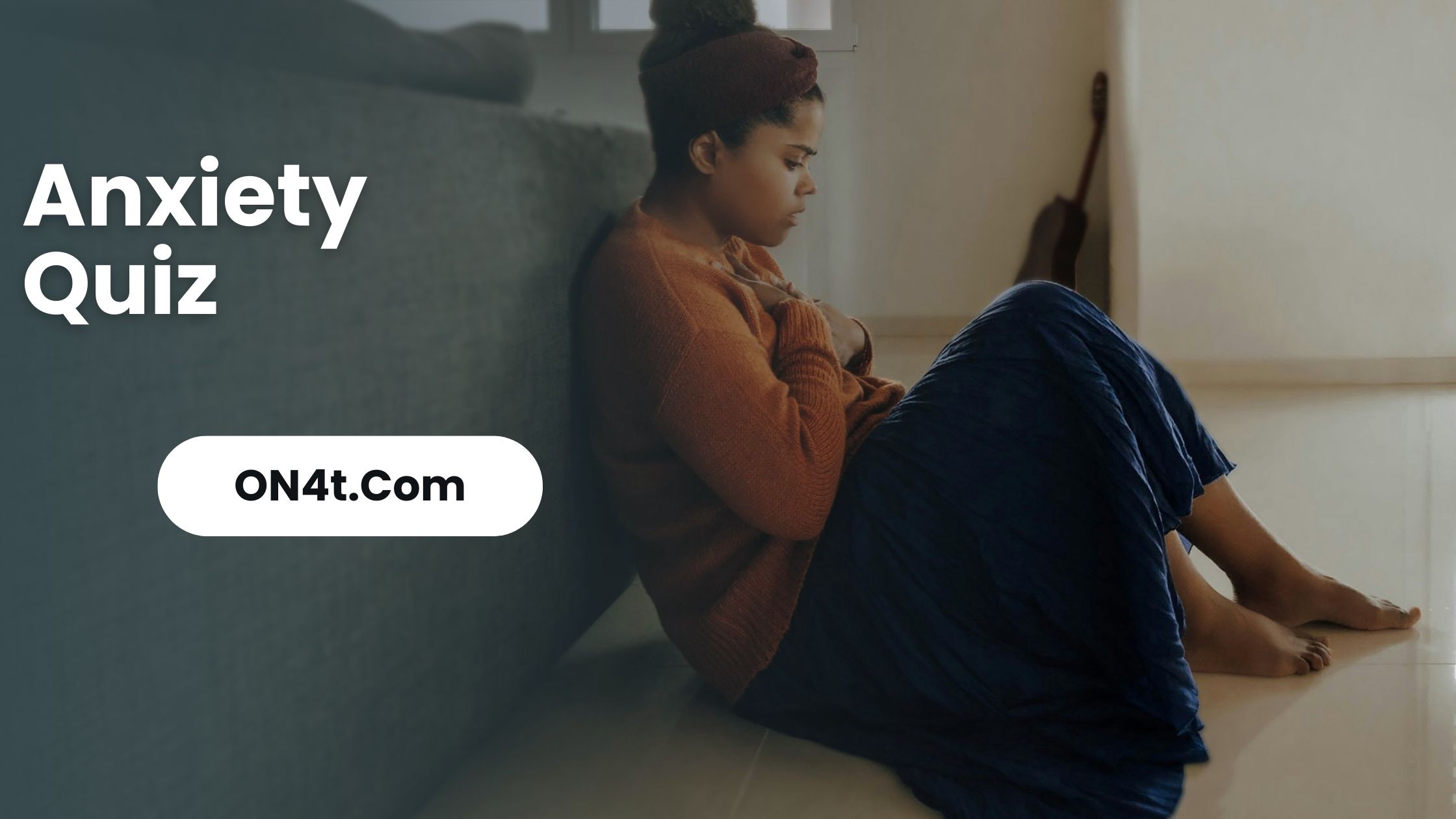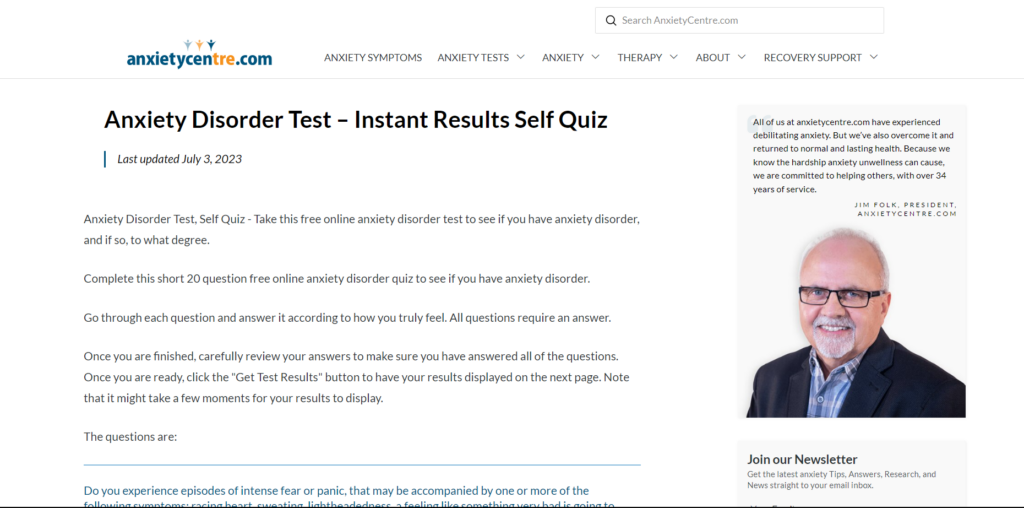Anxiety is a common mental health concern that affects millions of people worldwide. It’s normal to experience some anxiety in response to stressful situations, but when anxiety becomes persistent, excessive, and interferes with daily life, it may be a sign of an anxiety disorder. Many people wonder if their anxiety levels are normal or if they might have an anxiety condition.
This article offers a simple Anxiety Quizwith multiple-choice questions (MCQs) to help you evaluate your anxiety symptoms. We’ll also address frequently asked questions (FAQs) about anxiety disorders and provide some interesting facts to expand your understanding of this mental health topic. Please keep in mind that online quizzes are not a replacement for a professional assessment and diagnosis. If you are experiencing significant anxiety symptoms, it’s essential to consult with a mental health provider for personalized guidance and support.
Exploring Do I Have Anxiety Quiz
A Do I Have Anxiety quiz is a self-assessment tool designed to help individuals evaluate their anxiety symptoms and determine if they may be experiencing an anxiety disorder. These quizzes typically consist of a series of multiple-choice questions that ask about the frequency, intensity, and impact of common anxiety symptoms, such as excessive worry, restlessness, irritability, and physical symptoms like muscle tension or sleep disturbances.
While such quizzes can provide valuable insights and help people recognize potential anxiety issues, it’s crucial to remember that they are not a substitute for a professional diagnosis. If your quiz results suggest that you may have an anxiety disorder, the next step is to consult with a mental health provider, such as a therapist or psychiatrist, who can conduct a thorough assessment and provide an accurate diagnosis based on your unique experiences and symptoms.
Why is the Do I Have Anxiety Quiz A Must-Try?
Increased self-awareness: Taking an anxiety quiz can help you become more attuned to your symptoms and recognize patterns in your thoughts, feelings, and behaviors. By answering questions about your experiences, you may gain valuable insights into how anxiety is impacting your daily life. This heightened self-awareness can be an essential first step in addressing anxiety and seeking appropriate support.
Validation and normalization: Many people who struggle with anxiety feel isolated and alone in their experiences. Taking an anxiety quiz and learning that others share similar symptoms can provide a sense of validation and help normalize your feelings. Realizing that anxiety is a common issue can reduce stigma and encourage you to seek help without shame or hesitation.

Motivation to seek help: If your quiz results indicate that you may have an anxiety disorder, it can serve as a wake-up call and motivate you to take action. Recognizing the severity of your symptoms can be the push you need to reach out to a mental health professional for further evaluation and treatment. Early intervention can prevent anxiety from worsening and improve your overall quality of life.
Educational value: Anxiety quizzes often provide information about different types of anxiety disorders, common symptoms, and potential treatment options. By engaging with this content, you can expand your understanding of anxiety and feel more empowered to make informed decisions about your mental health. This knowledge can also help you communicate more effectively with healthcare providers and loved ones about your experiences.

Sample Do I Have Anxiety Quiz Questions And Answers
How often do you feel nervous, anxious, or on edge?
a) Not at all
b) Several days
c) More than half the days
d) Nearly every day
How often do you find it difficult to control your worrying?
a) Not at all
b) Several days
c) More than half the days
d) Nearly every day
How often do you feel restless, fidgety, or have trouble sitting still?
a) Not at all
b) Several days
c) More than half the days
d) Nearly every day
How often do you feel easily fatigued or have difficulty concentrating?
a) Not at all
b) Several days
c) More than half the days
d) Nearly every day
How often do you experience muscle tension, headaches, or stomachaches due to anxiety?
a) Not at all
b) Several days
c) More than half the days
d) Nearly every day
Answers:
a) 0 points, b) 1 point, c) 2 points, d) 3 points
a) 0 points, b) 1 point, c) 2 points, d) 3 points
a) 0 points, b) 1 point, c) 2 points, d) 3 points
a) 0 points, b) 1 point, c) 2 points, d) 3 points
a) 0 points, b) 1 point, c) 2 points, d) 3 points
Scoring:
0-4 points: Your anxiety symptoms appear to be within a normal range. However, if you’re concerned about your anxiety levels, it’s always a good idea to discuss them with a mental health professional.
5-9 points: You may be experiencing mild to moderate anxiety symptoms. Consider reaching out to a mental health provider for further evaluation and support.
10-15 points: Your quiz results suggest that you may be experiencing significant anxiety symptoms. It’s important to consult with a mental health professional for a comprehensive assessment and appropriate treatment options.
Frequently Asked Questions (FAQs)
What’s the difference between normal anxiety and an anxiety disorder?
Everyone experiences anxiety from time to time, but when anxiety becomes persistent, excessive, and interferes with daily life, it may be an anxiety disorder. Normal anxiety is typically situational and resolves once the stressor passes, while anxiety disorders involve ongoing, disproportionate fears and worries that are difficult to control.
Can anxiety disorders be cured?
While there is no definitive “cure” for anxiety disorders, they are highly treatable. With the right combination of therapy, medication (if needed), and self-care strategies, most people with anxiety disorders can learn to manage their symptoms effectively and lead fulfilling lives. Treatment aims to reduce the intensity and frequency of anxiety symptoms and improve overall quality of life.
Can anxiety disorders develop at any age?
Yes, anxiety disorders can develop at any stage of life, from childhood through adulthood. Some people may experience anxiety symptoms early in life, while others may develop anxiety later in response to specific stressors or life transitions. Regardless of when anxiety symptoms emerge, it’s important to seek help from a mental health professional for an accurate diagnosis and appropriate treatment.
Conclusion
Taking a “Do I Have Anxiety” quiz can be a helpful first step in assessing your anxiety symptoms and determining whether you might benefit from professional support. These quizzes can increase self-awareness, provide validation, and motivate you to seek help if needed. However, it’s crucial to remember that online quizzes are not a substitute for a professional evaluation and diagnosis.
If your quiz results suggest that you may be experiencing significant anxiety symptoms, the most important action is to consult with a mental health provider, such as a therapist or psychiatrist. They can conduct a thorough assessment, provide an accurate diagnosis, and recommend a personalized treatment plan to help you manage your anxiety effectively.
This article is super helpful in understanding the Do I Have Anxiety Quiz. Plus, if you are into making excellent texts, the on4t font generator is a top choice to style up your words. It is simple, fun, and the best for adding that special touch to your texts or quizzes.